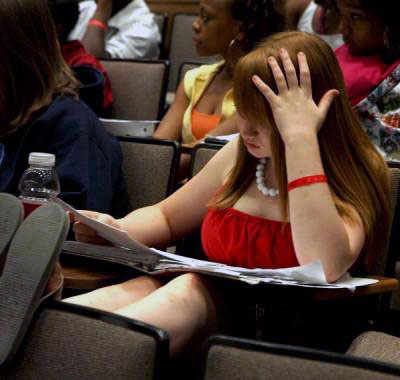All Nonfiction
- Bullying
- Books
- Academic
- Author Interviews
- Celebrity interviews
- College Articles
- College Essays
- Educator of the Year
- Heroes
- Interviews
- Memoir
- Personal Experience
- Sports
- Travel & Culture
All Opinions
- Bullying
- Current Events / Politics
- Discrimination
- Drugs / Alcohol / Smoking
- Entertainment / Celebrities
- Environment
- Love / Relationships
- Movies / Music / TV
- Pop Culture / Trends
- School / College
- Social Issues / Civics
- Spirituality / Religion
- Sports / Hobbies
All Hot Topics
- Bullying
- Community Service
- Environment
- Health
- Letters to the Editor
- Pride & Prejudice
- What Matters
- Back
Summer Guide
- Program Links
- Program Reviews
- Back
College Guide
- College Links
- College Reviews
- College Essays
- College Articles
- Back
School Days Off for Muslims MAG
We all believe in social equality, don't we? We all should, because America's Muslim citizens wish to celebrate their holy days in peace and cheer, not filled with the stress of missing classes and making up assignments. Islam is the second-most practiced religion in the world, and our country should address the needs of its Islamic citizens properly. The federal government should give two days off from school for the major Muslim holidays in order to grant religious rights, alleviate inconveniences imposed on Muslims, and develop an interfaith community.
Muslims make up a significant portion of the population, so they have the same rights as Jews or Christians. Currently, an estimated 2.8 million Muslims live in America. Islam is the third-most practiced religion in America, following Christianity, and is believed to be growing. The considerable Muslim population impacts the local economy and education systems. Yet our nation undoubtedly prefers to recognize Judeo-Christian customs. Weekends take place on Saturday and Sunday, the primary days of worship for Jews and Christians. School breaks are scheduled with respect to the major religious holidays of Jews and Christians, often coinciding with celebrations of Passover and Easter. In fairness, school calendars should acknowledge Muslim traditions as well.
The policy of not assigning homework and tests in recognition of holidays is problematic as well. First, a majority of teachers do not follow these rules. Second, these specified dates never appear to fall near Muslim holidays, defeating the whole plan.
Similarly, young Muslims often face the difficult situation of going to school and missing a holy day or celebrating their holy day and missing school. A friend of mine often skipped school for holy days when she was younger, but as her studies grew more complex, she skipped the holy days more frequently. “It created a great divide between me and my family,'' she says. For those who do skip school, a greater burden of making up missed work prevents them from enjoying the holy day. Every year, I have to come home and complete homework on a day that I would like to spend in joy with my family and friends. We should, at least, have our holidays off so that we can enjoy these days in serenity. After all, can you imagine doing homework on Christmas Day or Christmas Eve?
Finally, during Ramadan, the month leading up to Eid Al-Fitr, Muslims across America fast from sunrise to sunset each day, for 30 days, going without food or drink. Attending school, participating in extracurricular activities, and taking physical education courses greatly inconvenience Muslim students who fast regularly. Despite humble requests for awareness of my fasting, many of my teachers forget as the month proceeds.
If schools closed for Muslim holidays, a clearer understanding of the Islamic religion would emerge, creating an interfaith community. Most students do not know much about Islamic culture, aside from the deceptive images they see in the media. Many misconceptions of Muslims have unjustly arisen, especially after the terrorist attacks. On behalf of the many American Muslims, we think that Islam has been wrongly blamed for the violence and prejudice of a few wrongdoers. Allowing these days off could potentially eliminate any shared insecurities of the Muslim youth about feeling uncomfortable. Riad Mustafa, president of an Islamic center, has said, “Our kids will feel that as much as they respect other religions and holidays such as Christmas and Hanukkah, now others from other religions are respecting their faith.'' Granting two holidays off allows us to learn about the Islamic religion through Muslim students, and establishes a more diverse community. After all, my school district, like many, celebrates diversity.
Of course, citizens may not want to close school in fear of depriving students of their education. But when most Muslims miss school on these holidays, it causes a high percentage of absent students in certain areas.
After the terrorist attacks, non-Muslim citizens may feel uneasy about celebrating the holidays of such a controversial ethnic group. But if people truly believe in social equality, there would be no real problem with this proposal. Citizens display insincerity if they disagree with expanding religious rights out of fear. Religious freedom doesn't mean anything if equal privileges don't apply to people of different belief systems.
Muslims are a prominent part of the nation's population and should have the same rights as any other ethnic group. Holidays would build the acceptance of diversity and interfaith within the community. If we acknowledge the beliefs and traditions of other cultures, then other cultures should acknowledge ours.

Similar Articles
JOIN THE DISCUSSION
This article has 25 comments.
From a (non-Isla.mic) American standpoint, this is a good idea. It makes sense that Mus.lim kids should get days off for holy days as well.
However, in practice this might vex some parents and make them gripe about the government taking still more days off in addition to furlough days and holidays. :\

6 articles 1 photo 29 comments
Favorite Quote:
Don’t just get started. Keep going.